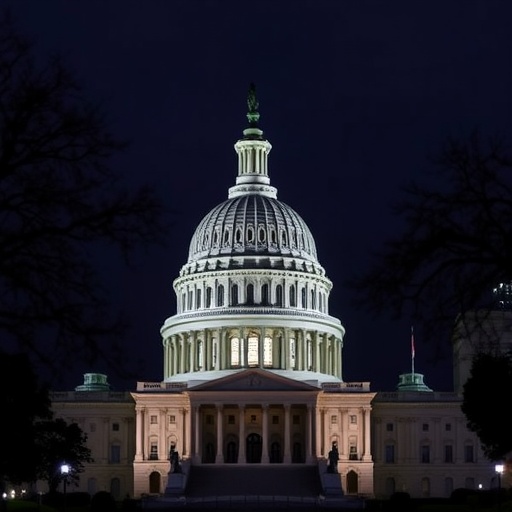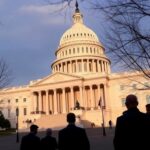House of Representatives Cancels Votes as Government Shutdown Drags On: Federal Employees and Military Face Pay Uncertainty
In a stunning move that underscores the deepening political divide in Washington, the House of Representatives has officially canceled all scheduled votes for next week, extending the uncertainty caused by the ongoing government shutdown. This decision, announced late Friday, leaves lawmakers sidelined and amplifies the anxiety gripping federal employees and military personnel, who are increasingly worried about their next paychecks amid the fiscal stalemate.
- Shutdown’s Toll on Federal Employees: Stories of Hardship Emerge
- Military Personnel Braces for Pay Delays: National Security at Risk?
- Behind the Scenes: Partisan Gridlock Forces House Votes Cancellation
- Economic Fallout Widens: Businesses and Communities Feel the Squeeze
- Paths Forward: Bipartisan Talks Heat Up Amid Shutdown Pressure
The shutdown, now in its third week, stems from a bitter partisan dispute over border security funding and disaster relief measures. With no resolution in sight, the House Speaker’s office confirmed the votes canceled to allow more time for negotiations, but critics argue it’s a sign of congressional paralysis. As non-essential government operations grind to a halt, over 800,000 federal workers remain furloughed, and essential services like air traffic control and national security continue under strained conditions.
Shutdown’s Toll on Federal Employees: Stories of Hardship Emerge
The human cost of the shutdown is mounting daily, with federal employees across the country sharing harrowing accounts of financial strain. In a statement released Saturday, the American Federation of Government Employees (AFGE) highlighted that more than 380,000 civilian federal workers are on unpaid furlough, while another 420,000 are working without pay. “These dedicated public servants are the backbone of our government, yet they’re being treated like pawns in a political game,” AFGE President Everett Kelley said in an interview with CNN.
Take Sarah Jenkins, a 45-year-old IRS auditor from Virginia, who has been furloughed since the shutdown began on December 22. “I’ve dipped into my savings to cover mortgage payments and groceries for my two kids,” Jenkins told reporters outside the Capitol. “We’re not asking for handouts; we just want to get back to work and get paid for it.” Her story is echoed by thousands: the U.S. Office of Personnel Management reports that federal workers have already lost an estimated $2.3 billion in wages since the impasse started.
Statistics paint a grim picture. According to a Brookings Institution analysis, previous shutdowns have led to a 10-15% drop in consumer spending among affected households, exacerbating economic slowdowns. This time, with holiday bills piling up, food banks in D.C. and other federal hubs have seen a 30% surge in demand. “The shutdown isn’t just closing offices; it’s closing doors on American families’ stability,” noted economist Mark Zandi of Moody’s Analytics.
- Over 800,000 federal workers impacted, per CBO estimates.
- Average annual salary for furloughed employees: $85,000, leading to weekly losses of up to $1,600 per person.
- Long-term effects include increased debt and mental health challenges, as reported by the National Alliance on Mental Illness.
Beyond immediate pay issues, the votes canceled in the House mean delayed action on bills that could provide relief, such as extending unemployment benefits tailored for federal workers. As the impasse continues, community support networks are stepping in, with organizations like the Capital Area Food Bank distributing emergency aid to 5,000 affected families last week alone.
Military Personnel Braces for Pay Delays: National Security at Risk?
While federal employees bear the brunt, active-duty military members are equally vulnerable, facing unprecedented uncertainty over military pay. The Department of Defense has assured troops that they will receive paychecks on time for the current period, thanks to prior appropriations. However, with the shutdown extending into January, future military pay is in jeopardy, affecting over 2.1 million service members and 700,000 civilian Pentagon employees.
“Our men and women in uniform shouldn’t have to worry about putting food on the table while defending our nation,” Senate Minority Leader Chuck Schumer tweeted Saturday, calling for immediate bipartisan action. Defense Secretary Mark Esper echoed this sentiment in a Pentagon briefing, stating, “We are working around the clock to ensure pay continuity, but Congress must act to prevent a crisis.”
The implications are profound. A 2019 Government Accountability Office (GAO) report on the last major shutdown found that 40% of military families resorted to credit cards or loans to bridge gaps, with some facing eviction threats. This time, with deployments ongoing in the Middle East and Europe, morale could suffer. Veteran advocacy group VoteVets reported that 25% of surveyed service members are already delaying medical appointments due to financial stress.
- First-line supervisors and commanders are authorized to approve emergency loans from morale funds.
- Non-essential base services, like child care centers, are closed, forcing families to seek alternatives.
- Historical precedent: During the 2018-2019 shutdown, Coast Guard pay was delayed by 35 days, leading to a spike in food pantry usage on bases.
Experts warn that prolonged delays in military pay could ripple through recruitment and retention efforts. The Army, already struggling to meet enlistment goals, might see a 5-7% drop in applications if paychecks falter, according to RAND Corporation projections. As the House of Representatives shelves votes, including those on defense budgets, the Pentagon is preparing contingency plans, but the strain on operational readiness is palpable.
Behind the Scenes: Partisan Gridlock Forces House Votes Cancellation
The decision to cancel votes in the House of Representatives didn’t come in a vacuum; it’s the latest fallout from a fiercely contested budget battle. Republicans, led by President Trump’s demand for $5.7 billion in wall funding, have clashed with Democrats over comprehensive immigration reform and aid for hurricane-ravaged states. House Speaker Nancy Pelosi announced the votes canceled after a closed-door caucus, citing “fruitless negotiations” as the reason.
“We can’t in good conscience proceed with business as usual when our government is paralyzed,” Pelosi said in a floor speech. On the other side, House Minority Leader Kevin McCarthy accused Democrats of “grandstanding,” insisting that border security must take precedence. This deadlock has roots in the midterms, where Democrats gained control of the House but face a slim majority, making consensus elusive.
Contextually, this shutdown is the third longest in U.S. history, surpassing the 21-day impasse of 1995-1996. The Congressional Budget Office estimates the current shutdown has already cost the economy $11 billion, with daily losses mounting at $160 million. Bipartisan groups, like the Problem Solvers Caucus, have proposed compromise bills—including $1.6 billion for border tech and $11 billion in disaster aid—but they’ve stalled amid procedural hurdles.
Insiders reveal that the votes canceled also stem from internal GOP fractures, with moderate Republicans from shutdown-hit districts pressuring leadership for a deal. A leaked memo from the House Rules Committee shows that 15 key votes, including farm aid extensions vital to rural economies, were scrubbed from the calendar.
Economic Fallout Widens: Businesses and Communities Feel the Squeeze
Beyond Washington, the shutdown‘s tentacles are reaching into everyday American life, straining businesses and local economies. Small contractors reliant on federal projects, such as those building national parks infrastructure, report halted work and unpaid invoices totaling $300 million, per the U.S. Chamber of Commerce.
In Yellowstone National Park, entrance fees have plummeted 90% due to closures, costing gateway towns like West Yellowstone, Montana, up to $1 million daily in lost tourism revenue. “Our hotels are half-empty, and staff are being laid off,” said local chamber president Amy Johnston. Similarly, in aviation, the FAA’s reduced staff has led to flight delays averaging 20 minutes nationwide, impacting airlines and passengers alike.
Broader stats from the Federal Reserve indicate a 0.1% GDP hit per week of shutdown, potentially shaving 0.3% off quarterly growth. Food inspection delays at the USDA have slowed meat processing, raising prices by 2-3% in supermarkets. For federal employees and military families, this means compounded woes: a survey by the Partnership for Public Service found 60% are cutting discretionary spending, which in turn hurts retail sectors.
Non-profits are mobilizing; Feeding America has launched a “Shutdown Relief Fund” aiming to raise $10 million for food assistance. Meanwhile, states like California are fronting loans to federal workers, with Governor Gavin Newsom signing an executive order to expedite $100 million in aid.
Paths Forward: Bipartisan Talks Heat Up Amid Shutdown Pressure
As the shutdown wears on, glimmers of hope emerge from renewed negotiation efforts. White House officials and congressional leaders are slated for closed-door talks this week, with a focus on decoupling border funding from other priorities. Senate Majority Leader Mitch McConnell has indicated willingness to consider a short-term spending bill to reopen government, potentially by mid-January.
“The American people deserve better than this circus,” said Independent Senator Angus King, advocating for a clean continuing resolution. Public pressure is building: a Quinnipiac poll shows 54% of voters blame both parties equally, with approval for Congress at a dismal 18%. Advocacy from groups like the Chamber of Commerce and AARP could tip the scales, pushing for protections on military pay and federal employees‘ back pay guarantees.
Looking ahead, experts predict that if resolved soon, economic recovery could be swift, with retroactive pay restoring confidence. However, prolonged delays risk deeper scars—potentially influencing the 2020 elections and future budget battles. The House of Representatives‘ cancellation of votes buys time, but at what cost? As one Hill staffer put it anonymously, “We’re all racing against the clock to avoid a national embarrassment.” With stakes this high, the coming days will determine if Washington can bridge the divide before the shutdown’s damage becomes irreversible.








